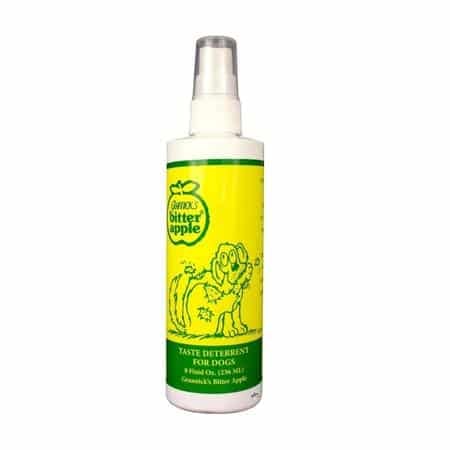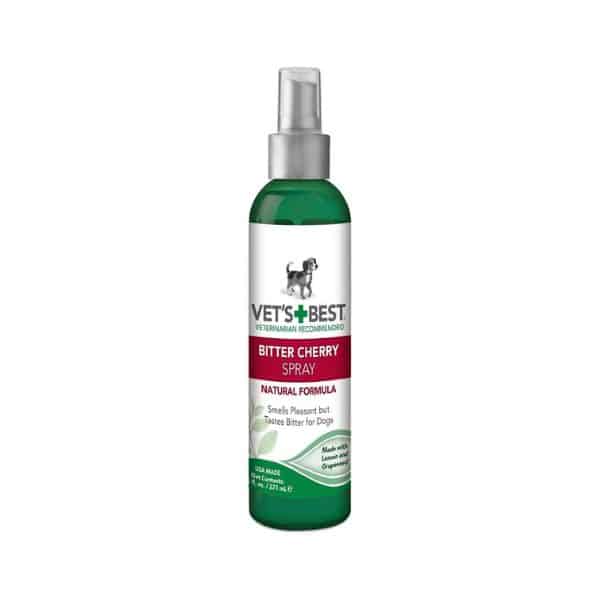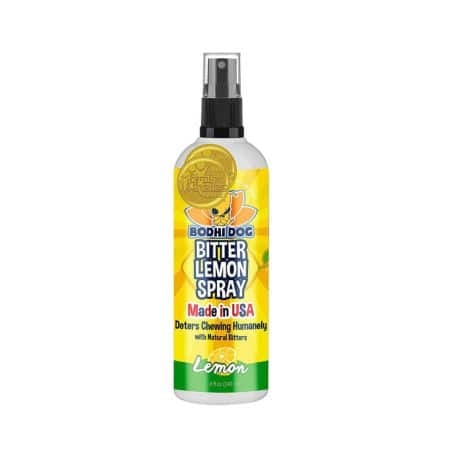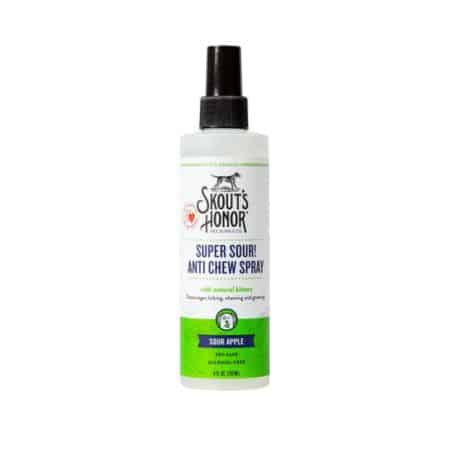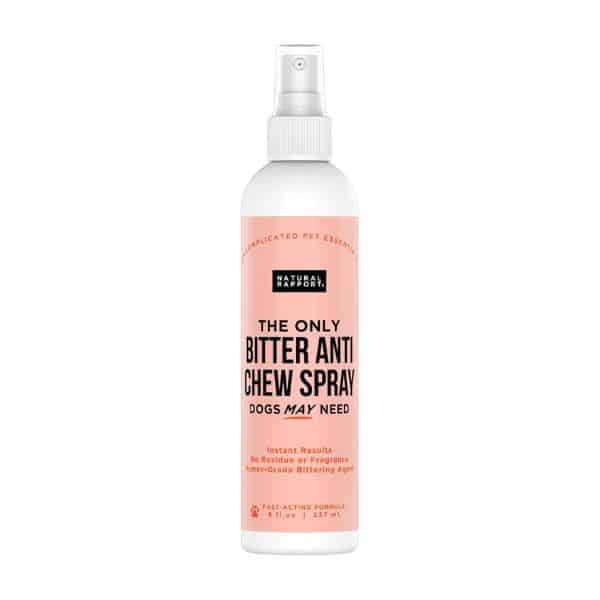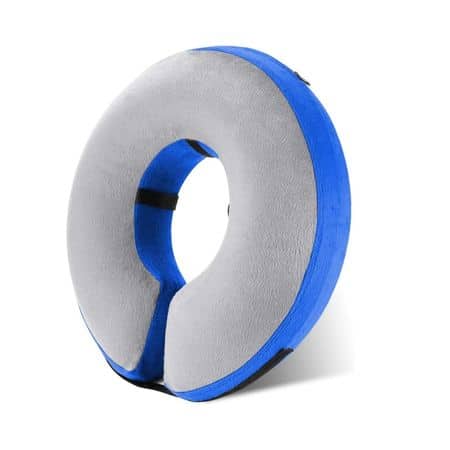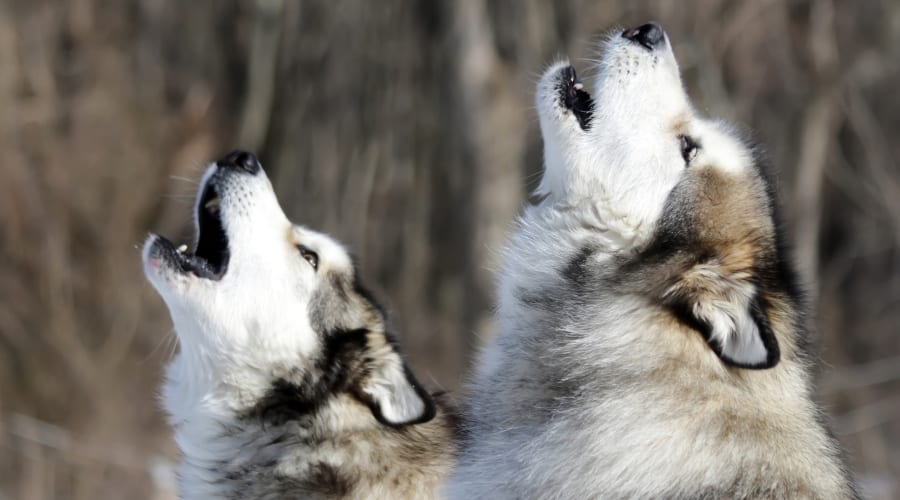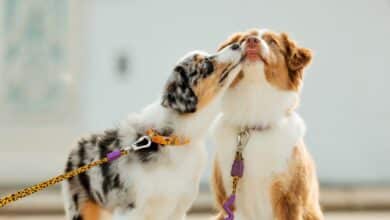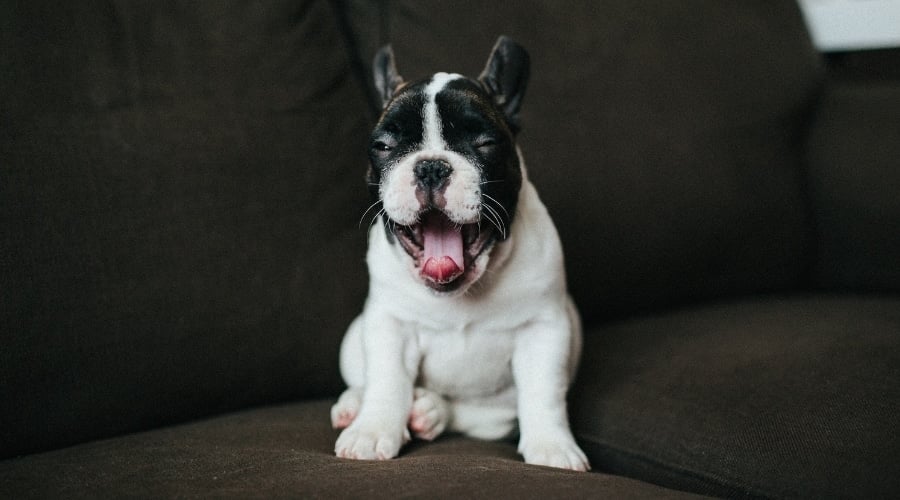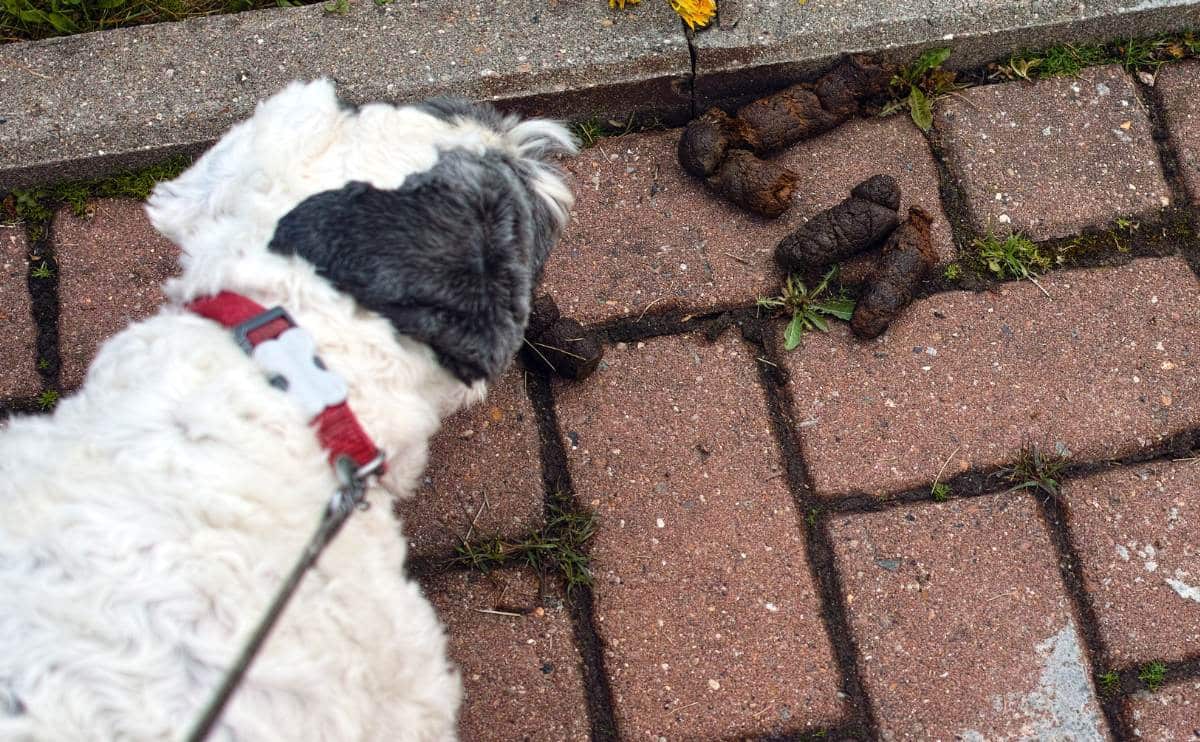Top 15 Best Anti-Chew Sprays For Dogs (Tested & Reviewed)
When you purchase through links on our site, we may earn a commission. Here’s how it works.
So, you have a new pup that shreds anything he can sink his teeth into? Or maybe your middle-aged dog won’t stop biting his fur? An anti-chew spray may be the perfect solution! This foul-tasting spray can stop your dog in his tracks, turning a troublesome chewer into a well-behaved pooch. We spent 80+ hours reviewing over 15 different anti-chew sprays. Here are just a few of the ones we tested.
Table of Contents
All told, with the help of over 100 dogs, we reviewed the spray’s success rate, ingredients, and how long each one lasted. All to answer a single question:
Which Anti-Chew Spray Is Best?
| Best Overall | Multiple Sizes | Spray + Training | Most Well-Known | Alcohol-Free |
|---|---|---|---|---|
 | 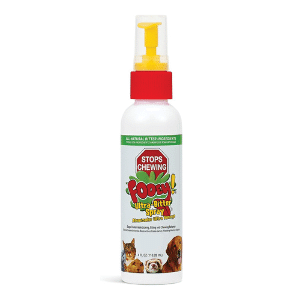 |  |  | 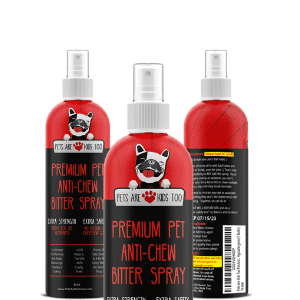 |
| Rocco & Roxie Extreme | Fooey! Ultra | Emmy’s Best | Grannick’s Bitter Apple | Pets Are Kids Too |
| View on Amazon | View on Amazon | View on Amazon | View on Amazon | View on Amazon |
| Read Review | Read Review | Read Review | Read Review | Read Review |
Want the answer? Then read on!
What Is An Anti-Chew Spray?

A bottle of anti-chew spray contains a bad-tasting but harmless liquid. You can use this spray to discourage your dog from chewing or licking things he shouldn’t, such as drywall, furniture, or electrical wires.
You might also hear anti-chew spray referred to as a no-bite spray, dog deterrent, or even bitter apple spray. Whatever you call it, it’s the same thing.
The exact formula of an anti-chew spray varies from brand to brand. Most commonly, a bitter ingredient, such as grapefruit skins, is used.
It’s the bitter ingredients that deter your dog. If you have ever seen a dog suck on a lemon (It’s hilarious!), you know how much they hate the sour taste. Anti-chew sprays are even more sour than a lemon.
Dogs taste whatever it is they are chewing on. When they get a lick of the bitter chew spray, they immediately give up.
While it may look like your dog is suffering, it’s completely harmless.
Allow me to show you how it works.
Here is Norris, chewing on my daughter’s toy. He has his own plush dog toys, and this one is off-limits…
But he loves this toy so much that he can’t resist and will sneak off with it if I am not around.
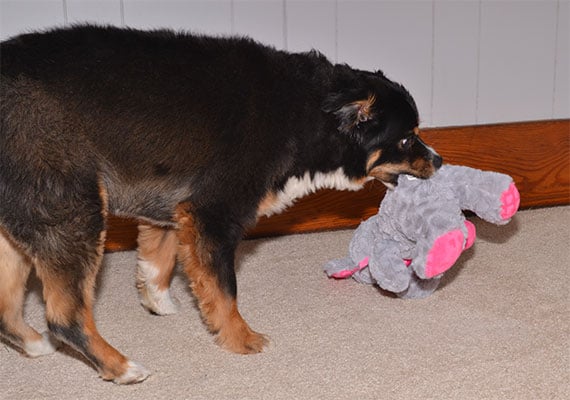
A light mist from the anti-chew spray bottle…
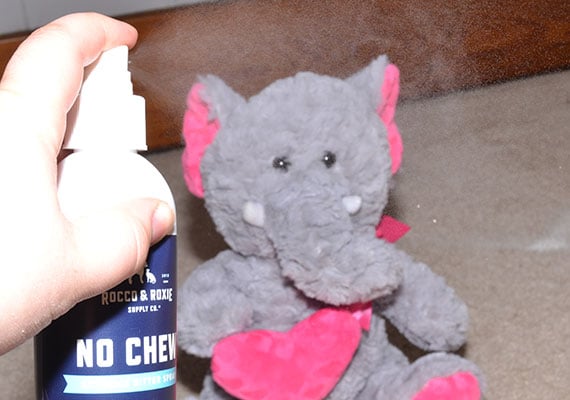
The next time he tried to grab the toy, he was rewarded with a foul taste.
I don’t have to tell you that Norris didn’t like it. In fact, he made this face for a good 2 minutes!
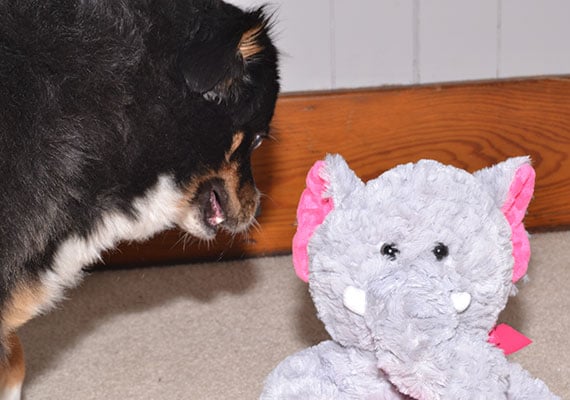
Norris is a smart dog. He decided one taste was enough, and now he won’t go near the plush toy or the spray bottle.

Success! Norris no longer seeks out this toy to play with when I’m not around.
It’s important to note that an anti-chew spray isn’t a dog repellent. A dog repellent keeps your dog away from specific areas in your home, often using chili powder. Your dog will still go near an anti-chew spray; he just won’t bite it.
Oh, and it goes without saying that your dog needs to sniff and lick the anti-chew spray for it to be effective. Your dog must taste the sour spray before deciding it’s not worth the effort.
Does Your Dog Need An Anti-Chew Spray?
If your dog is a destructive chewer, then a bottle of anti-chew spray could stop him in his tracks.
But don’t rush out and buy a bottle of anti-chew spray just yet.
You didn’t think it would be that easy, did you?
First, you need to determine why your dog is chewing things you don’t want him to.[1]
You see… Anti-chew sprays may stop your dog from chewing, but they don’t solve the cause. This means the moment you stop using an anti-chew spray, your dog will return to his chewing ways.
If you want the best results from an anti-chew spray, then it should be used in addition to correcting the destructive behavior.
Let me show you three examples to explain what I mean…
1. A New Puppy

Puppies explore and learn by biting. They also chew to ease the discomfort of their developing teeth. This means everything in your home is fair game – from crate bedding and shoes to furniture legs and electrical cords![2]
The Solution:
Place chewable items like shoes out of reach and introduce your pup to a range of toys he can chew on. Train your puppy that chewing on anything else is unwanted behavior. Further, discourage him by using an anti-chew spray on chewable objects that can’t be moved.
2. Boredom
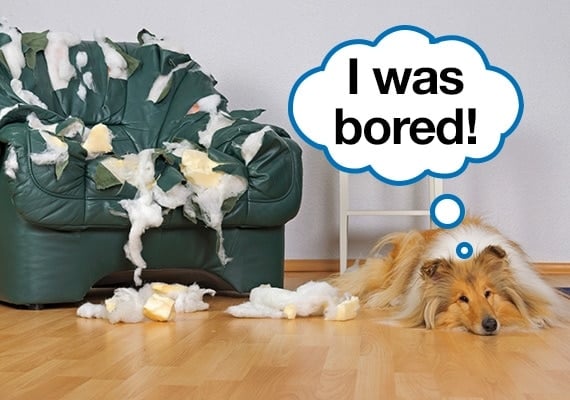
A bored dog will look for a way to entertain himself. Unfortunately, that may include chewing on your baseboards or couch.[3]
The Solution:
Provide your dog with a range of toys, and train your pup that chewing on anything else is off-limits. Use an anti-chew spray on whatever he shows an interest in.
3. Separation Anxiety
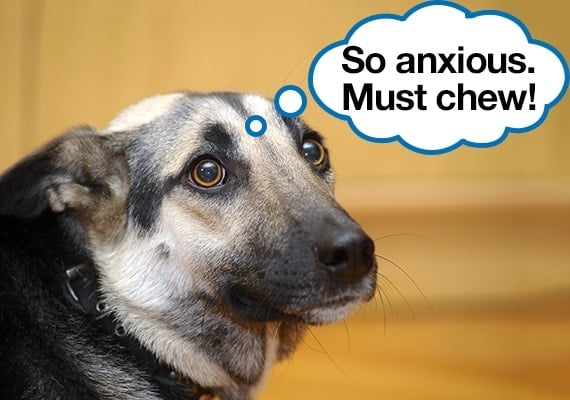
If your dog is left home alone, he might become anxious when you leave. This is called separation anxiety. Many dogs chew to relieve this anxiety.[4]
The Solution:
Training is necessary to get your dog used to time alone. While making the transition, spray commonly chewed areas with an anti-chew spray.
As you can see, an anti-chew spray works best while also treating destructive behavior. Think of an anti-chew spray as a training aid—one that helps your dog know what he can’t chew on.
Solely relying on an anti-chew spray rarely curbs the destructive behavior. You are just slapping a band-aid on a problem that needs addressing. The moment you stop using the spray, the same behavior will start again.
Even so, the best anti-chew sprays are more than capable of preventing a determined dog from chewing on things he shouldn’t. Which brings me to my next point…
Do Anti-Chew Sprays Really Work?
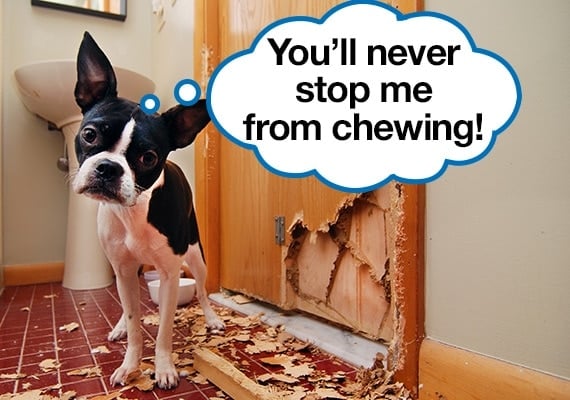
Yes, but you need to find the right anti-chew spray for your dog.
You see, choosing the best no-chew spray for your dog is a game of chance. What works for one dog might not necessarily work for another.
As we quickly learned, different dogs have different tastes. One dog may find a particular anti-chew spray disgusting, but another might think it’s the tastiest thing he’s ever licked.
Even those of the same breed…
Bolt, a Rottweiler, wouldn’t go near a particular anti-chew spray made from bitter apple – it even prevented him from chewing on his favorite chew toy.
Duke, another Rottweiler, couldn’t get enough of it. He wouldn’t stop licking anything we coated it in. It’s like he thought it was a treat.
Depending on your pup’s taste buds, you may need to test a few different anti-chew sprays before finding the right one. Unfortunately, this makes choosing the ideal chew spray for your dog a lesson in trial and error.
Canine Journal Tip:
Are you struggling to find the best anti-chew spray for your dog? Check the bottle. Many anti-chew sprays contain similar ingredients. If your dog doesn’t react to one anti-chew spray, try another with a different formula.
You know if an anti-chew spray works by your dog’s reaction…
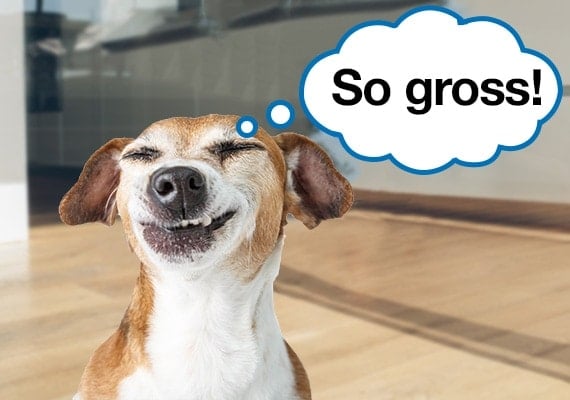
Some dogs might lick the spray and walk away, while others will bear their teeth or stick their tongue out in disgust. The most hilarious reactions we saw included a Bulldog growling at a ball covered in anti-chew spray and a Dachshund running and hiding under his favorite blanket.
Based on our testing, I believe anti-chew sprays will work for most dogs. By the end, we had tested anti-chew sprays on over 100 different dogs. Out of all the anti-chew sprays we reviewed, at least one deterred every dog…
Well, except for one special little pooch. She was the only dog that was immune to all the sprays we tested.
However, after investigating further, I found the reason…
Summer is a 16-year-old Golden Retriever suffering from an extreme case of sensory decline.[5] She has lost her sense of taste and smell.
Yep, she couldn’t taste the bitter ingredients in any anti-chew spray we used. If your dog lacks a sense of taste, skip anti-chew sprays.
How We Tested

At Canine Journal, we don’t recommend any products we wouldn’t happily give our own pups.
Because of this, we vigorously tested, compared, and reviewed each anti-chew spray featured in this guide.
The first thing we had to do was narrow down which anti-chew sprays to review.
We interviewed dozens of owners of puppies and dogs that chew and those who have experience using anti-chew sprays. Coupled with advice from our veterinary consultant, Dr. Sara Ochoa, we had a pretty clear picture of what we needed to buy and test for.
Since anti-chew sprays are a low-cost product, we decided to test all the most popular brands on the market.
We purchased 18 different anti-chew sprays from Amazon. Yep, we pay the full retail price, just like you would!
Ordinarily, this is the part where we would bring in our doggy testers. However, as we learned in our research, different dogs have different tastes. Just because an anti-chew spray works on one dog doesn’t mean it will work on another.
Take Holly, for instance. She loved the taste of many anti-chew sprays…
Time and time again, we would apply anti-chew spray…
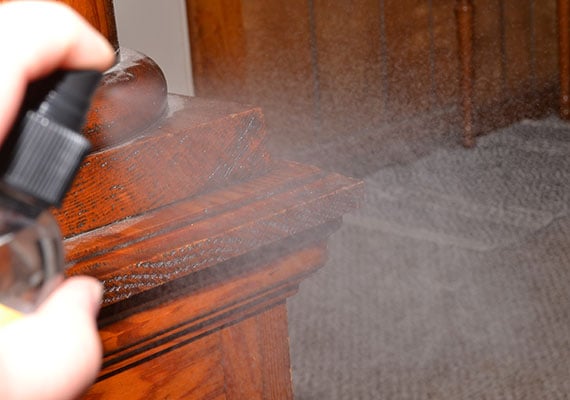
And each and every time, she would sit there and happily lick it off.
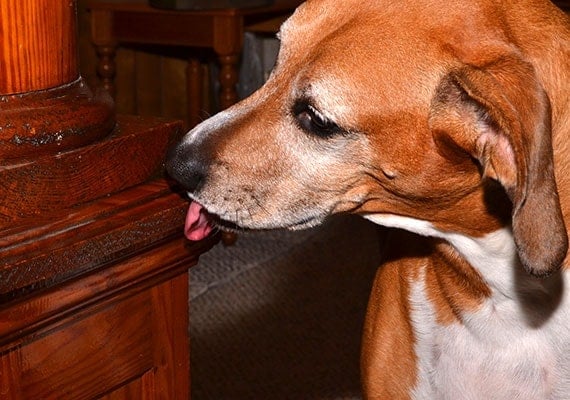
Other anti-chew sprays were so unappealing that she would stick her tongue out in disgust after tasting them.
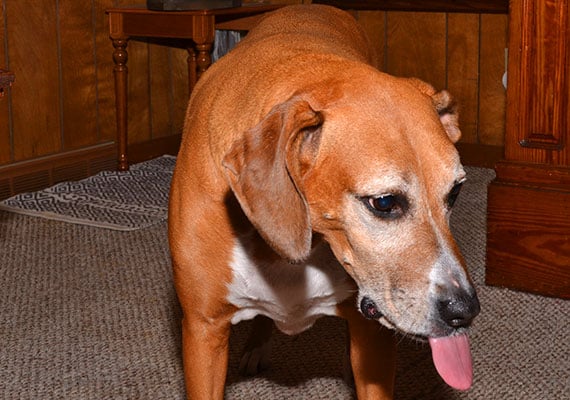
She wouldn’t give these another lick.
So, we set out to build the largest testing team ever assembled for a Canine Journal review!
After our team solicited favors from every dog owner they knew and approached strangers at local dog parks, we rounded up a wide range of dogs.
Our team of puppy testers included a variety of power chewers, including a German Shepherd, Jack Russell Terrier, Pit Bull, and Beagle.
All up, well over 100 dogs took part in our anti-chew spray review.
Every anti-chew spray featured in this guide was tested by at least 50 different dogs, allowing us to find the sprays that deterred the widest range of dogs.
The following two factors weighed heavily when choosing our top picks:
1. How many dogs were deterred by the anti-chew spray?
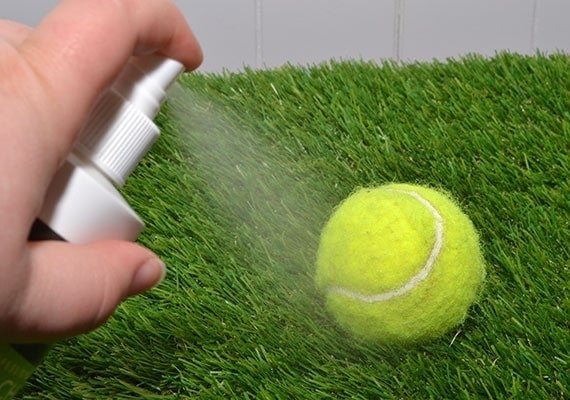
Out of the 50+ dogs that licked and sniffed the anti-chew spray, how many were deterred by it? We did this by using a rubber ball and offering it to the dog. We took the ball away and sprayed it with an anti-chew spray. We then offered it again to our tester. If he accepted the ball, the anti-chew spray failed for that dog.
2. Does the anti-chew spray leave a stain?
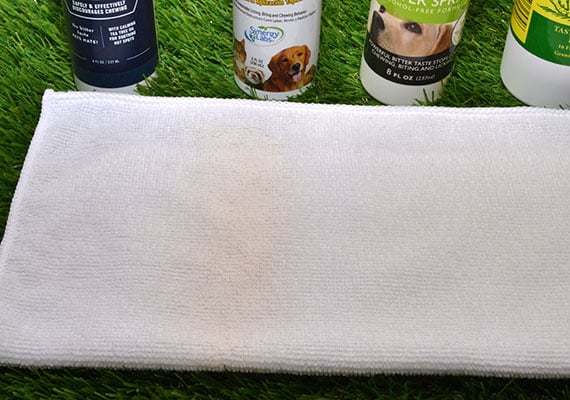
We applied each anti-chew spray to a power cord, piece of painted drywall, sealed piece of wood, and cotton sheet. We then cleaned each surface with ordinary household cleaners. The sheet went through a wash cycle. Any anti-chew spray that could not be easily removed, discolored, or stained failed.
We considered the following during testing:
- Was the anti-chew bottle easy to spray?
- Did the spray nozzle clog during testing?
- Was the anti-chew spray scented?
- Could the anti-chew spray be applied directly to a dog?
- Did the anti-chew spray contain ingredients that are dangerous to dogs?
Testing Observations
While testing each anti-chew spray for the above qualities, we made some observations that are worth mentioning…
1. Watch Those Ingredients
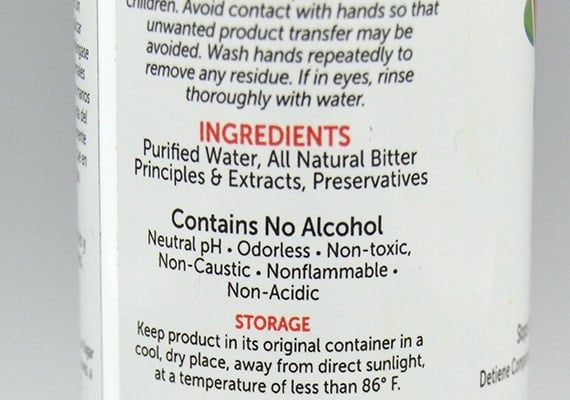
I know, I know… If you have chosen a good anti-chew spray, then your dog shouldn’t be licking or biting it at all.
But for your dog to determine that he doesn’t like the spray, he’ll likely lick it.
Now here’s the problem: Some things are dangerous near your dog’s mouth.
For example, isopropanol (rubbing alcohol) was found in some of the anti-chew sprays we tested. Isopropanol is considered toxic to dogs, even in small amounts [6], and you should probably avoid giving it to your dog in large quantities.
Tea tree oil is a little more complicated. This commonly used anti-chew spray ingredient is considered non-toxic in concentrations less than 1-2%. Anti-chew spray brands to keep the tea tree oil below this amount.
Inspect the ingredients of any anti-chew spray you buy, especially if your dog has allergies.
2. You Can Apply Some Anti-Chew Sprays Directly To Your Dog
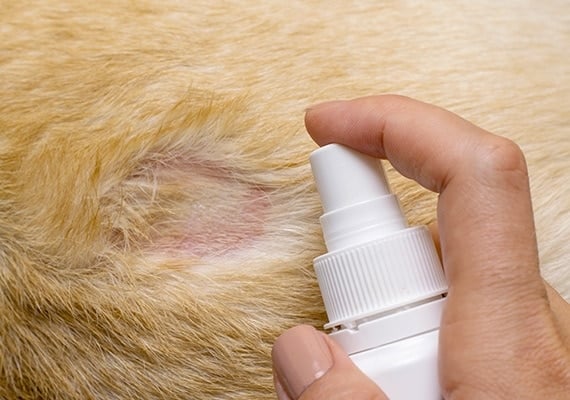
During our review, we encountered many owners who used an anti-chew spray to stop their pups from chewing on injuries. I myself have a pup who obsessively licks a sore spot on her leg, and I have tried several of our test products on her.
Grunt, a snuffly Bulldog, recently had surgery to remove a foxtail that was deeply embedded in his leg. His owner used an anti-chew spray to stop him from biting his stitches.
Another owner used an anti-chew spray to stop a Golden Retriever from licking at an itchy hot spot.
When used on injuries, an anti-chew spray can be a great alternative to the cone of shame.
3. Dog Sprays Might Not Stop A Determined Dog
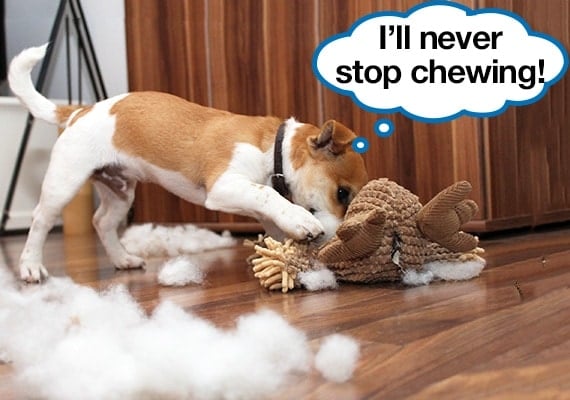
Pepper is a Dalmatian who looooooves to play. She might just be the most toy-obsessed dog I have ever met. Pepper loves to play so much that she ignored every anti-chew spray we used with her. She could obviously taste it because she sneered as she picked up the balls, but her desire to play overcame the bitter flavors and foul scents.
Interestingly, Pepper also has a fleece blanket that she will happily chew the corners of. When we sprayed this with an anti-chew spray, she gave the blanket a small nibble before reeling in disgust. She didn’t pick it up again until we washed it. I suspect this is because she is not as obsessed with her blanket as she is with her toys.
Fortunately for Pepper, she is allowed and encouraged to chew on her dog toys. However, this does show that an anti-chew spray may not stop a super-determined dog from chewing.
It is for this reason that an anti-chew spray should be used as a training aid. The one-two punch of an anti-chew spray and dog training will stop your pup’s destructive behavior for good.
4. Many Anti-Shew Sprays Smell
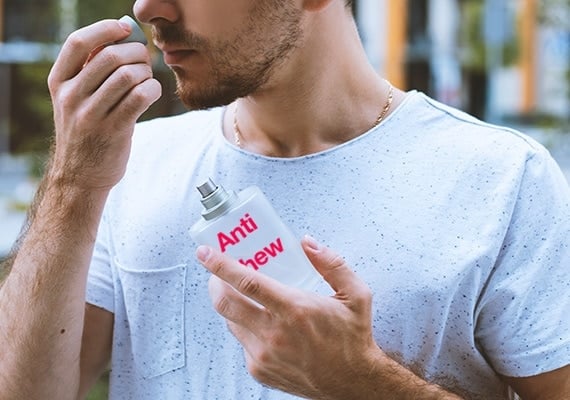
Anti-chew sprays come in a wide range of scents. Some are basically odorless, while others give off a strong odor. While many were pleasantly scented, some had a strong medicine-like smell.
Fortunately, for most sprays, this was only noticeable when you held the spray up to your nose.
This won’t be a problem if you spray your baseboards or chair legs. Unless you get down on all fours or have a super-sensitive nose, you won’t be able to smell these areas.
But things can get a little problematic when spraying pillows and blankets, as these household items sit closer to your nose. I discovered this when testing the anti-chew sprays on throw pillows at my mother’s house. Let me tell you—some sprays stink!
I’ll do my best to describe the scent of each anti-chew spray when I reveal my top picks.
5. How Long An Anti-Chew Spray Lasts Depends On Your Dog
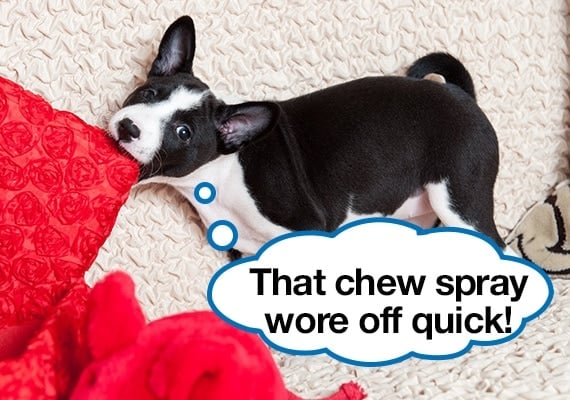
One factor we wanted to test when ranking anti-chew sprays was their longevity. After all, it doesn’t matter how well an anti-chew spray works if you need to reapply it every hour to deter your dog.
Unfortunately, testing this quality proved to be harder than we anticipated. Some dogs stayed clear for a day or two but others only for a few hours – even among the same breed.
As a result, we decided to scrap these results because they proved to be inconclusive.
Okay, now it’s time to share the best and most effective anti-chew sprays available…
Best Anti-Chew Sprays For Dogs
Have you decided to try an anti-chew spray? Based on our test results, here are 15 different anti-chew sprays ranked from best to worst.
Most Effective Overall: Rocco & Roxie Extreme Bitter Spray Review
View on Amazon | View on Chewy
When it came to anti-chew sprays, there was one clear winner. Nine out of ten dogs outright rejected anything we coated with the Rocco & Roxie Extreme Bitter Spray.
There is a lot to love about this anti-chew spray. It doesn’t stain, and the tea tree oil scent is pleasant. Best of all, it is alcohol-free and non-staining. It won’t sting if you spray it directly on your dog. Rocco & Roxie has a 90% success rate. The spray uses an emulsifier, bitter agents, and tea tree oil.
If you are looking for an anti-chew spray to stop your destructive dog, this should be your starting point. There is a good chance it’s the last anti-chew spray you will ever need.
Price
In-Depth Review Of Rocco & Roxie
Be sure to read our full review of The Rocco & Roxie for details on their anti-chew spray and other products, such as odor eliminators, shampoos, and supplements.
Best Anti Chew Spray In Multiple Sizes: Fooey! Ultra Bitter Training Spray Review
View on Amazon | View on Chewy
The Fooey! Ultra-Bitter Training Spray comes in second. It is another strong performer; eight out of ten dogs were disgusted by this chew deterrent. It has a mild citrus scent. Fooey! uses all-natural bitter principles and extracts, which include grapefruit skin and King of Bitters. It has an 80% success rate.
This is one of the few anti-chew sprays that is available in multiple sizes. For those who need a lot of anti-chew spray, the 16-ounce bottle is twice the size of most of the other anti-chew sprays we tested.
What the smaller-sized Fooey! Ultra-Bitter spray lacks in size, it makes up for in portability. It easily fits at the bottom of my handbag without leaking. Pull it out when your dog starts being destructive away from home, such as in the car. It is non-staining, so it is safe to use on multiple surfaces.
Price
Best Anti-Chew Spray + Training Program: Emmy’s Best Review
View on Amazon | View on Chewy
Emmy’s Best is another strong performer. Interestingly, it also includes a training program, which they guarantee will eliminate chewing in just 14 days. Emmy’s Best has a lovely lemon and tea tree scent. The ingredients include water, polysorbate, isopropanol, bitter principles, propylene glycol, and tea tree oil. In our testing, this one had a 78% success rate.
This was also one of the only anti-chew sprays we reviewed that offered a money-back guarantee. Their website states that if it doesn’t work, you can send it back for a full refund—even if the bottle is empty.
Be mindful that this anti-chew spray contains isopropanol (rubbing alcohol), which can sting if sprayed on an open wound.
Price
Most Well-Known No Chew Spray: Grannick’s Bitter Apple Review
View on Amazon | View on Walmart
I don’t think an anti-chew spray has been on the market longer than Grannick’s Bitter Apple Spray. I’m pretty sure this is the same spray my mom bought back in the ’90s for our Dachshund, who loved to chew on the curtains. It’s been a long time, but I don’t think the bottle has changed one bit! The isopropanol alcohol smell is the same for sure.
Interestingly, this was the only anti-chew spray that failed our stain test. We sprayed this on a white cotton sheet and left it to dry before putting it through a wash cycle. An obvious off-white stain remained. It had a 76% success rate in our testing.
For this reason, we do not recommend Grannick’s Bitter Apple Spray for fabrics like curtains, pillows, and couches.
I was kind of disappointed that Grannick’s Bitter Apple didn’t smell anything like apples. Instead, it smells strongly of rubbing alcohol, largely due to isopropanol being a major ingredient. We advised above that isopropanol is something to avoid, so we recommend going with a more natural product without it or making sure your dog doesn’t ingest much of this product at a time.
Grannick’s Bitter Apple worked best on hard surfaces. It doesn’t leave a sticky residue and can easily be removed with a damp cloth.
Price
Best Alcohol & Propylene Glycol Free: Pets Are Kids Too Bitter Spray Review
The Pets Are Kids Too no-chew spray performed quite well. However, the bottle is terrible. The wrapper on all the bottles we tested slid around as we sprayed, making the bottle difficult to grip. The scent is very bitter, and the ingredients include water, a bittering agent, and preservatives.
The bottles also had other problems. The nozzle on one of our sprays dripped during each spray, covering our hands. Another leaked when it was laid on its side.
This one had a 70% success rate in our testing.
Price
Most Bitter No Chew Spray: Fur Goodness Sake Bitter Apple Spray Review
Another strong performer, the Fur Goodness Sake Bitter Apple Spray, was previously sold under the OmegaPet brand. Don’t worry if you get a bottle branded with OmegaPet. It’s the same thing.
This was the only anti-chew spray we reviewed that listed denatonium benzoate as the bittering agent, commonly called Bitrex. This is one of the most bitter synthetic chemicals available. It’s non-toxic and commonly used to coat small objects that kids might otherwise swallow. Nintendo game cartridges are coated in this.[7]
Fur Goodness Sake has a tea tree scent and does not stain. On our scale, it scored a 64% success rate.
Price
Best Value No Chew Spray: Out Bitter Cherry Chew Deterrent Review
View on Amazon | View on Walmart
My biggest gripe with anti-chew sprays is that they come in tiny bottles. If you apply them regularly, you’ll soon run out.
That’s why I was rooting for Out! Bitter Cherry Chew Deterrent to place first. At 32 fluid ounces, this is one of the most generous anti-chew sprays on the market, and it has a very reasonable price. It has a very pleasant cherry scent and does not leave stains behind.
Unfortunately, it came down to a coin flip as to whether dogs would be deterred by the spray or not. Almost 50% of our testers happily licked this spray without a reaction.
Interestingly, this anti-chew spray attracted many of our dogs to whatever objects it was sprayed on, possibly because of its strong, pleasant cherry smell. Many of our dogs stopped what they were doing and came over to investigate the source of the scent.
While this makes it the nicest smelling anti-chew spray we reviewed, you don’t want your pup attracted to the object you want him to stop chewing – especially if he is one of the dogs not deterred by this no-chew spray.
Price
Best Vet Approved No Chew Spray: Vet’s Best Bitter Cherry Spray Review
View on Amazon | View on Chewy
Guess what? This anti-chew spray has the same formula as the previous one. This is because Vet’s Best and Out! are owned by the same company—they simply reused the recipe. It has the same sour cherry scent. Ingredients include water, bitter agents, grape seed extract, lemon extract, and natural bitter cherry flavor.
As you might expect, the performance was identical. The only difference is that Vet’s Best Bitter Cherry Spray comes in a four times smaller bottle and costs more to boot!
Pay more, get less? Buy the Out! Bitter Cherry Chew Deterrent instead.
Price
Best Money Back Guarantee: Bodhi Dog Bitter Lemon Spray Review
This is another anti-chew spray available in multiple sizes. Bodhi Dog Bitter Lemon Spray also offers a money-back guarantee if you are unsatisfied with their anti-chew spray. This spray is marketed as all-natural and uses water, natural bitter agents, and lemon extract. However, Bodhi’s includes isopropanol 20%.
We advised above that isopropanol should be avoided, so we recommend going with a more natural product without it or making sure your dog doesn’t ingest much of this product at a time.
In our testing process, Bodhis spray had a 56% success rate. For some dogs, it worked very well.
One of our test dogs, Daisy, an aggressive chewer, did not respond well to some of the other sprays, but this one worked quite well for her. We sprayed it on a bandage she wears regularly on her leg due to a medical issue. and she did not lick it at all after the initial tester to see what it was. It also worked when sprayed on physical objects like doors and dog gates she paws at.
However, it has a strong smell that leans towards alcohol rather than natural lemon. As far as bitter scents go, this one is fairly pleasant and not very bitter. This is also not great for dogs that lick at a raw or sore spot, as the alcohol makes it sting.
Price
Best Tea Tree Oil Scented No Chew Spray: Particular Paws Anti-Chew Bitter Spray Reviews
Interestingly, the Particular Paws Anti-Chew Bitter Spray had the same ingredients as Emmy’s Best, the third place anti-chew spray. However, there might be a difference in the formula as dogs were considerably more likely to chew something coated in this anti-chew spray.
Particular Paws formula includes purified water, polysorbate-20, bitter principles, tea tree oil, and propylene glycol. It has a strong tea tree oil scent and a 50% success rate in our testing.
Price
Best Fragrance-Free: Skout’s Honor Super Sour Anti Chew Spray Review
This is a powerful spray with a strong flavor but no fragrance. It has an intense sour apple flavor, as pups dislike the sour taste. Skout’s Honor is alcohol-free and safe for both cats and dogs. It is safe for indoor and outdoor use. It contains no sulfates, parabens, triclosan, petroleum, cocobentaine, added colors or dyes, or Diethanolamine and has not been tested on animals.
For every purchase, the company donates a day’s worth of food to a needy dog. This product aims to deter pesky habits, stop aggravating licking and chewing, and may be helpful as a behavioral training tool. It is not as effective as some others, which may have to do with the lack of scent. Some dogs actually liked the flavor, as it’s more sour than bitter.
Price
- Starts at $4.56
Best Human Grade No Chew Spray: Natural Rapport Dog Bitter Spray Review
We had a little trouble with Rapport Dog spray. The ingredients are great: water, a human-grade bittering agent, and preservatives with a tea tree oil scent. When freshly applied, it was more than capable of deterring a chewer.
However, it didn’t appear to have any effect once dry. The problem is that it dries quickly. In the heat, it took less than 10 minutes for the spray to dry completely. At this point, our dogs happily put their mouths on whatever it was sprayed on.
The Natural Rapport Dog Repellent Spray works, but not for long enough. Due to this, it only had a 10% success rate for us.
Price
If a spray just isn’t for you, I suggest trying an inflatable Elizabethan collar.
Best Alternative To A No Chew Spray: Katoggy Inflatable Collar Review
View on Amazon | View on Walmart
An inflatable Elizabethan collar can be a wonderful alternative to a traditional cone or spray. It is quite comfortable and does not block your dog’s vision or impede its ability to move or feel balanced. I have used the Katoggy collar with dogs of various sizes. All my pups do well in this collar and can see, move around unhindered, sleep, and eat without any trouble while wearing it. Best of all, it prevents any licking without chemicals or a mess.
The Katoggy attaches to an existing collar and has Velcro straps so owners can make a snug fit. It comes in four sizes, and the airbag comes out easily to wash the cover.
Price
- Starts at $15.98 ($15.98 / Count)
What About DIY No Chew Spray Options?
Quite a few dog parents out there want to make things for themselves, and no-chew spray is no exception.
No Chew Spray DIY Recipes
I also tested 3 homemade chewing deterrent recipes:
- 2 parts lemon juice to 1 part white vinegar – 22% success rate
- 2 parts apple cider vinegar to 1 part white vinegar – 32% success rate
- 1 part cayenne to 10 parts water – 50% success rate
Interestingly, all of these DIY recipes worked to some degree. However, that was when they were freshly applied. Repeating the test after the spray dried saw a significantly lower success rate. The only recipe still effective after drying was the one with cayenne. However, it tended to stain.
Overall, the homemade recipes failed to impress. If you are determined to go down this route, I recommend the apple cider vinegar and white vinegar combination. One of our team members adds lemon juice to this, which she says gives it an extra boost. Even then, she reapplies the spray quite often. Dogs do not like the smell or taste of citrus, but it may not be enough in a DIY spray to be effective. So, DIY formulas are often hit or miss.
Our Final Results
Phew, if you made it this far, congratulations! You now know which anti-chew spray is best for your dog.
A recap of our results…
The top 5 best anti-chew sprays we reviewed:
- Rocco & Roxie Extreme Bitter Spray – 90% Effective
- Fooey! Ultra-Bitter Training Spray – 80% Effective
- Emmy’s Best – 78% Effective
- Grannick’s Bitter Apple Spray – 76% Effective
- Pets Are Kids Too Bitter Spray – 70% Effective
Which anti-chew spray or deterrent stops your dog from unwanted chewing? Let me know in the comments below!
Do You Need More Help?
In some cases, owners may need more help than a topical spray or physical blocker. If your pup refuses to stop chewing, you must work with your veterinarian to rule out any medical causes. After that, consider consulting an animal behaviorist or professional dog trainer. These professionals are trained in canine behavior and have a deeper understanding of what may be motivating chewers.
Warning: If you want to use an anti-chew spray to keep your pup from chewing on his skin, get your vet’s approval first. And never apply it to incisions or severe wounds. If your dog is licking or gnawing at a serious wound, you should contact your veterinarian as soon as possible to make sure your dog hasn’t damaged their healing. An Elizabethan collar is usually the best deterrent in these cases.
Try These Other Anti-Chew Methods
Pups often chew out of boredom, so entertain your pup with plenty of physical and mental activity options. They also need mental stimulation, so interactive dog toys like maze feeders, puzzle toys, and a change of scenery on daily walks are all effective ways to keep them entertained. This prevents boredom, which will prevent chewing. You may consider a super chewer subscription box for super persistent pups. Distraction is often an effective method if you have a pup chewing on an open wound, paw, or specific area. You may need to wrap the site, use spray, and then provide your dog with a distraction like a new chew toy or a licking mat. You can spread peanut butter, cheese, or another tasty treat on it and give your pup something better to lick or chew.
Why Trust Canine Journal?
Danielle is a dog owner with over thirty years of canine care experience. She has a lifelong commitment to rescuing shelter animals and has given several special needs dogs a second chance at a happy life. As a professional researcher, Danielle dedicates herself to providing pet parents with the most up-to-date, accurate, and helpful information to help better their pets’ lives. She has personally tested and reviewed hundreds of pet products. Her two sweet pups, Falkor and Daisy, are happy to help her in this research and thoroughly enjoy testing out products for her to review. Danielle is proud to work alongside a talented and dedicated professional team to bring the most accurate, recent, and helpful information to dog owners.



